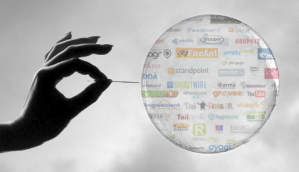 The dreaded “B” word is on the tip of many tongues these days. Are we or aren’t we in a bubble? Everybody has an opinion.
The dreaded “B” word is on the tip of many tongues these days. Are we or aren’t we in a bubble? Everybody has an opinion.
Yes, Facebook’s valuation lingers around $50 billion, Zynga’s is close to $10 billion, and Twitter is valued at $4.5 billion with comparatively tiny revenues. But do these soaring valuations a bubble make? A couple of weeks ago, Eric Schmidt weighed in on the great overblown bubble debate to say that the high rate of valuations do, in fact, mark a clear sign of a growing bubble.
While, in contrast, Paul Graham said last week that, compared to late ’90s when every company even remotely associated with this hot, newfangled “Web” was valued higher simply by being associated with it, today’s high valuations are more localized and the companies more deserving. Yet, perhaps the question is not whether this is a bubble exactly like that of the dotcom era, but whether or not it is, simply, a bubble.
Fellow TechCruncher MG Siegler weighed in on the issue to say that, while smaller angel investors do seem to be getting squeezed out of deals because early stage valuations are (in some cases) getting ridiculously high, there’s really no sure sign that a Web 2.0 bubble exists. And Paul Carr and Sarah Lacy would likely fight you for hinting that there’s anything remotely bubbly going on in the Valley.
In particular, there’s also been a lot of talk recently about a tech IPO bubble. Back in the late ’90s many companies rushed into public markets even when they knew they might not become profitable for as long as two years after an IPO. Yes, Groupon is likely to IPO soon, and yes Pandora and LinkedIn recently filed to go public, but these are healthy companies that need capital for expansion and have a good chance at profitability in the next year or so. What’s more, Facebook even pushed the Securities and Exchange Commission for an exemption that would allow it to stay private. Not something you do if you’re in a bubbling rush, right?
Yet, even so, the tech press can’t seem to help itself when it comes to bubble mania. If one is able to pin down an Angel for a conversation, inevitably the “B” word is raised — especially when that Angel was party to the infamous Angelgate.
Today, at the DEMO Conference in Palm Springs, Co-founder and Partner of Floodgate Funds Mike Maples gave the audience his own personal view: “Is there a tech bubble? Rounded off to the nearest yes, yes”, he said. Echoing Schmidt’s sentiments, Maples said that the super-sized valuations of Facebook, Zynga, and Twitter have spawned a host of imitators and that, as a result, there is now a huge crowding effect (read: bubble). “It’s like a soccer game for 9-year-olds, where everyone crowds around the ball,” he said.
Like Paul Graham, Maples hinted that the big companies leading the charge (those he calls “Thunder Lizards”) are deserving of high valuations, while the clones, who are not trying to solve big problems or disrupt an entire space and are instead simply copying these companies and pasting their business models into the same space, are the real problem.
Because of this, while Silicon Valley may not currently be in a bubble, he said, it’s well on its way. So, if the bubble is indeed growing, what can we do to counteract it? Instead of adding to crowded spaces (and the bubble), Maples encouraged startups to build wacky, unusual ideas, even if at first they don’t seem to have obvious application. “When I first invested in Twitter, before they were Twitter, people thought I was crazy” and that it was a “rinky-dink business”. Not so much. The Angel-turned-VC is known for investing in early-stage, potentially “risky” startups, and much of the time, he said, it doesn’t work out. But when it does, these ideas can change the world.
When there’s not a lot of obvious competition in a particular space, and the startup hoping to take advantage sees a big “potential” market, those can often become the true disruptors. And when it comes to looking for the right VC, he advised entrepreneurs to look for someone who knows when to pivot and how not to panic when that time comes. Look for those who are familiar with (and comfortable in) the near-death experience, he said, which you will definitely have — just because “you’re a startup”.